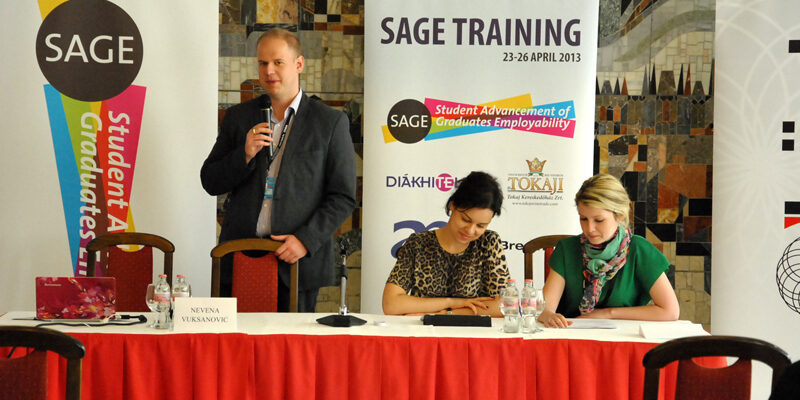
SAGE training: No jobs, no solution
BUDAPEST – Students’ perspectives need to be brought to decision makers in order to support the policy-making processes for sustainable higher education reforms. Therefore, ESU’s project called Student Advancement of Graduates Employability (SAGE) provides an important input to the current educational reforms as it addresses the question of why employability shouldn’t only be defined accordingly to labour market’s terms.
“Simply, if there are not enough jobs available, no solution can first of all be found to solve the problem of unemployment. The concept of employability and reforming education should therefore not be used as a means to solve a problem caused by the economic crisis,” says Taina Moisander, ESU’s Vice-Chair.
Disabled young people and graduates are more likely to suffer from the economic crisis than others, which is very unfortunate when society cannot afford anyone to be excluded from education.
These are among the many concerns raised at a training session organised in Budapest, Hungary, on 24 and 25 April in relation to the SAGE project on employability. Around one hundred delegates from national unions of students and other stakeholders in higher education participated in the event, aspiring at training student representatives in employment debates in a broad sense.
Analysing the job market
The participants looked at employability as a tool to enhance the Bologna Process rather than two separate issues. This is a vital topic, considering the increasing commodification of the higher education industry and its labour market orientation. The participants therefore also addressed the need to clarify what role higher education serves within each society.
“The definition and image of employability makes it difficult to include and analyse the whole process of accessing higher education and then the labour market. What does it mean for the individual to be able to find suitable and interesting work? One of the topics we discussed was if the possible learning outcomes matched the original intentions of education. Learning outcomes can play a great role in facilitating the process of enhancing one’s personal development as well as to improve the assessment processes of the education system,” says Taina Moisander, Vice-Chair of the European Students Union (ESU).
Next steps of the SAGE project
The outcomes of the training will be taken into account when the next steps of the SAGE project will be developed further. A review of the impact of the ET2020 on national reforms and policy-making is being carried out in the form of articles from the perspective of students in Europe. And a study on employability will be finished towards the end of 2013 together with a Handbook for the national unions of students. The final conference of the project will be held in the spring of 2014 presenting all the research outcimes.
Speakers and facilitators at the seminar came from various backgrounds, including the SAGE consortium partners in addition to the European Commission, EURASHE, Education International, ETUCE, Hungarian Bologna Experts, Hungarian Student Loan Center and Student Spokespersons for disabled students as well as ESU’s alumni members.
The participants in the training were encouraged to use social media and especially Twitter to debate the topics of each session by including the hashtag #ESU_SAGE. These updates were collected and saved in one discussion thread on Storify.

Several guest speakers were invited to the event. Photo/HÖOK
— END —
For more information, please contact:
Taina Moisander, ESU Vice-chairperson: +32/479.591.499 // taina@esu-online.org or Robert Hlynur Baldursson, ESU Communications Manager: +32/473.669.894 // robert@esu-online.org

The European Students’ Union, headquartered in Brussels, is the umbrella organisation of 47 national unions of students from 39 European countries. ESU represents and promotes the educational, social, economical and cultural interests of students at the European level. Through its member unions, ESU represents over 11 million students in Europe. To find out more about ESU, follow us on Twitter @ESUtwt, check out or Facebook page or visit www.esu-online.org. ESU celebrates its 30th anniversary in 2012.
